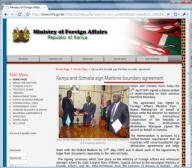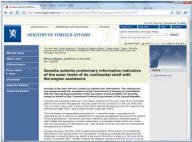| w w w . S o m a l i T a l k . c o m |
|
| |
How Kibaki's gimlet eyes espied Somalia's southern coastlineBy A/Rasaq H. Nuurre
According to a document submitted to the commission on the limits of the Continental shelf on May 2009, Kenya affirms strongly that it has overlapping maritime claims with adjacent coastal state of Somalia and that it has reached a Memorandum of Understanding with Somalia granting each country no objection in respect of submissions on the outer limits of the continental shelf to the Commission on Limits of the Continental shelf. This document is a clear evidence of what many experts predicted years ago and warned the Somali people that Kenya insanely yearned and has a great deal of interest the adjacent and unprotected Somalia's southernmost coastline. This unbridled greed of Kenyan government, however, intensified since president Mwai Kibaki assumed the office December 2002. Many Somali people, stunned and saddened by the unity government's unexpected speedy move, have immediately raised their voice against the agreement. They have suspicion about president Sharif's rapid jump into one of the most sensitive cases any Somali government would ever involve, the border issue. Somalia always had border dispute with its two neighboring countries , Ethiopia and Kenya. Both couturiers had been publicly military allies against Somalia. In Kenya, for instance, in the eyes of many government officials and some local obnoxious media outlets, "Somalia had been viewed their most enduring security headache since independence, starting with what they call 'Shifta movement' that waged a secessionist war supported by Mogadishu in the 1960s". Thereupon, the agreement sparked considerable debate between Somali public and Sheikh Sharif's government causing an angry backlash from almost every spot inside the country and in Diaspora. For this reason, the BBC Somali Service held first and last open debate on this maritime agreement on 10/4/2009. The debate was between two government ministers on one side and two members of the parliament on the other corner. Abdirahman Haji Adem Ibbi, the deputy prime minister and Abdirahman Abdishakur, the minister of planing and International Co-operations defended the government's decision to sign the agreement. Both men are known to have strong ties with president Sharif; they were among the first handpicked inner circle group of about 15 ministers their names were handed over to prime minister Sharmarke. So, the president is fully aware of whatever mission the two men are assigned.
On the other side of the debate, there were then-deputy prime minister Aidid Ilka Hanaf now MP and deputy of the speaker, Mohamed Omar Dalha. Initially, both of them criticized the way the agreement was reached and the government's "deliberate contempt" about the role of the parliament on this issue. In an interview with Simba Radio days after the agreement was reached, Mr. Dalha insisted that "the agreement between the two countries was inconclusive since it has not been through the legal channels", meaning that it was not through the parliament. Recently he shifted his position to a certain degree from opposing the agreement to supporting it. Also, several Somali Diaspora members participated the debate and asked questions. Abdirahman Abdishakur, the minister of planning who hastily signed the agreement on behalf of the Somali government, was angered several times during the debate by comments and questions made by some of the listeners; he was adamantly confronting any one projecting his or her voice against the agreement; at one point, he demanded from the mediator (Yusuf Nuh Dhule) to either quieten down the questioners because they were not, on his view, cognizant of the issue of the maritime and were also off the topic of the discussion, or otherwise the debate itself was a conspiracy against his government. It was the compassion of the mediator, however, to curb the angry minister and let the listeners continue to express their views freely; "they have a right to know about this issue, you know its their country and they are suspicious about the agreement; they want to know all about this agreement; let them phrase their ideas about the case and its your responsibility to convince the public and to answer their questions, Mr. Dhule returned to the minister's criticism. In that debate, the two ministers, ultra-confident all the time, openly defended the MOU and reiterated that if the Somali government had not sign the Memorandum of Understanding with the Kenyan government and also had not submit its continental shelf beyond 200 nm to the UNICLOS before May 13, 2009, Somalia could lose the right of its continental shelf beyond the 200 nm. None of the two ministers, however, was an expert on the maritime issue and their attempt to convince the public was a case in point. Their argument was clearly weak and based on the article 4 of annex II to the Convention where "a coastal State intending to establish the outer limits to its continental shelf beyond 200 nautical miles is obligated to submit particulars of such limits to the Commission on the Limits of the Continental Shelf along with supporting scientific and technical data as soon as possible but in any case within 10 years of the entry into force of the Convention for that State". Conversely, as indicated by the Report of the Eighteenth Meeting of States Parties held in New York on 13-20 June 2008, Somalia had a chance to halt this controversial maritime agreement or the memorandum of understanding; and similarly, due to Somalia's lack of an effective government system for many years, the report spared the unity government to proceed the preliminary document of the outer limits of the continental shelf to the commission on the limits of the continental shelf on 04/14/09. But, unfortunately, it was the might and the domination of few ministers in the Somali Council of Ministers plus their foreign advisers that hindered any effort to postpone this one-sided maritime agreement. Many critics believe that Somali officials should have never been, at the first place, to the office of the Kenyan foreign ministry to sign unequal agreement that served solely the interest of the Kenyan government. Somali government, in the minds of these critics, was not bound by this MOU according to the Report of the Eighteenth Meeting of States Parties held in New York on 13-20 June 2008. The report clearly states that several delegations pressed during the meeting that "a failure by a coastal State to meet its 10-year time period required by article 4 of annex II to the Convention would not deprive it of its entitlement over the continental shelf beyond 200 nautical miles". Accordingly, many countries responded to that and in fact adjourned their submission beyond the deadline. Thus, its crystal clear that Somali officials should not proceed both the agreement and the submission of its continental shelf since latter also requires more time and more focus. Moreover, as the report states, Somalia, due its long civil war and with no effective and stable government for many years, should request from the commission not to incorporate, at this time, such international commitments. Since the collapse of the Somalia's military regime in January 1991, there has been many attempts by Somalia's neighboring countries particularly Kenya and Ethiopia to back many fruitless international and regional efforts to restore any system in Somalia, warlord-ism, transitional governments, or even clannish regional authorities, as long as these systems safeguard their interests. Both countries hosted several Somali peace conferences. Alongside these self-interested political endeavors, Kenya, for instance, had been the powerhouse and the home to many Somali "politicians" for many years. Some of these politicians have Kenyan passports, others may be even Kenyan nationals. For example, the deputy prime minister, Sharif Hassan Sheikh Adam, who is at the same time the minister of finance, and the brain power of president Shariif, traveles with Kenyan passport. Former Somali prime minister, Ali Mohamed Ghedi, is another example. He resides peacefully in his multi million dollar palace in the suburbs of Nairobi after he displaced tens of thousands of his own people.
Moreover, Kenya is the UN's small Manhattan in East Africa. Many UN and international organizations have regional headquarters in Nairobi. The office of the United Nations Political Office for Somalia is one of them. It is established by the Secretary General "to advance the cause of peace and reconciliation through contacts with Somali leaders, civic organizations and the States and organizations concerned". However, according to the preliminary document submitted by the Somali unity government to the commission on the limits of the Continental shelf on 04/14/09, in October 2008 the Special Representative of the Secretary General for Somalia, Mr. Ahmedou Ould Abdalla, "initiated the preparation of the preliminary information indicative of the outer limits of the Continental shelf" and accepted an offer of assistance from the government of Norway which is an act that indicates the leading role of the office of SRSG in Somalia political system and how the Somali Unity Government suffers from self-doubt. Since "Tanzania and Kenya agreed to settle their maritime boundary dispute , Kenya's exclusive economic zone narrows as it proceeds seawards. As a result, Somalia's unguarded southernmost coastline came across the gimlet eyes of Kenya's president Kibaki soon after he took the office. Kibaki's government made several attempts earlier to sign an agreement with the previous Somali Transition Federal Government, but all failed due to unknown reasons. However, the recent Memorandum of Understanding on Somalia-Kenya maritime boundary between Kenya and Shariif's unity government and the submission of the preliminary indicative report to the UNICLOS by the Somalia's unity government with the help of the office of the Special Representative of the Secretary General for Somalia, Ahmedou Ould Abdalla, and his deputy Mr. Charles Petrie have left many unanswered questions for the Somali people and for many other observers. What kind of a role the UNIPOS office played on this controversial agreement? Equally important, It is naive "to make the assumption that Somalia has an effective government in place whose actions must be recognized, particularly in establishing national boundaries". And for this reason, any major boundary agreements between Somalia and other neighboring countries are contingent on reliable, and fully capable Somali government. By A/Rasaq H. Nuurre Faafin: SomaliTalk.com | June 15, 2009 | |
|
"Burcadda Qalinka: Norway, UN, iyo Kenya oo Qorshaha Xuquuqda Shidaal Qodista ka wada Xeebta Soomaaliya" Kulaabo bogga www.SomaliTalk.com © www.SomaliTalk.com La soo xiriir: |
 Victor Prescott and Clive Schofield stated in their book, The Maritime Political
Boundaries of the World, that since Tanzania and Kenya agreed to use a parallel
of latitude as their maritime boundary north of Pemba Island, Kenya's exclusive
economic zone narrows as it proceeds seawards. They also explicitly explained in
the book that it is unlikely that Kenya's geographical disadvantage, created by
the alignment of the coast, will persuade Somalia that the line of equidistance
is inequitable. Contrarily, the incompetent Somalia's weak unity government
which only controls few blocks in the capital, Mogadishu, signed uneven
memorandum of understanding on Somalia-Kenya maritime boundary with the Kenyan
government on April 7, 2009 in which, Consequently, Kenya uncovered more
strategies to claim large part of Somalia's territorial water.
Victor Prescott and Clive Schofield stated in their book, The Maritime Political
Boundaries of the World, that since Tanzania and Kenya agreed to use a parallel
of latitude as their maritime boundary north of Pemba Island, Kenya's exclusive
economic zone narrows as it proceeds seawards. They also explicitly explained in
the book that it is unlikely that Kenya's geographical disadvantage, created by
the alignment of the coast, will persuade Somalia that the line of equidistance
is inequitable. Contrarily, the incompetent Somalia's weak unity government
which only controls few blocks in the capital, Mogadishu, signed uneven
memorandum of understanding on Somalia-Kenya maritime boundary with the Kenyan
government on April 7, 2009 in which, Consequently, Kenya uncovered more
strategies to claim large part of Somalia's territorial water.  Unlike Ethiopia, which is the main source and the spiritual leader of many
Somali warlords, Kenya is the most trusted and the safe haven of these
despicable warlords. The warlords use Ethiopia as a traditional power base, but
Kenya is their hideout, power broker and luxury mansion house. Former Somali
warlords and almost every high ranking government officials including the
president himself spend time in Kenya's five star hotels and palaces. They
travel to and from the world through Nairobi or Mombasa airports. In addition,
Kenya is still the main transit camp for thousands of Somali refugees since the
beginning of the civil war nearly twenty years ago. For all these reasons,
Kenyan government has more advantage than any other country in the region to get
access into the current political system in Somalia to ensure its vital national
interest in Somalia, including its recent claim of Somalia's territorial waters
near the Raskiamboni peninsula. Hence, one cannot exclude the possibility of
self-interest above all else even if one holds a ministerial position for the
benefit of the Somali people.
Unlike Ethiopia, which is the main source and the spiritual leader of many
Somali warlords, Kenya is the most trusted and the safe haven of these
despicable warlords. The warlords use Ethiopia as a traditional power base, but
Kenya is their hideout, power broker and luxury mansion house. Former Somali
warlords and almost every high ranking government officials including the
president himself spend time in Kenya's five star hotels and palaces. They
travel to and from the world through Nairobi or Mombasa airports. In addition,
Kenya is still the main transit camp for thousands of Somali refugees since the
beginning of the civil war nearly twenty years ago. For all these reasons,
Kenyan government has more advantage than any other country in the region to get
access into the current political system in Somalia to ensure its vital national
interest in Somalia, including its recent claim of Somalia's territorial waters
near the Raskiamboni peninsula. Hence, one cannot exclude the possibility of
self-interest above all else even if one holds a ministerial position for the
benefit of the Somali people.
 Aragtida
Shariifka iyo Faroole ee Heshiiska is Afgarad ee Kenya Lala Galay
Aragtida
Shariifka iyo Faroole ee Heshiiska is Afgarad ee Kenya Lala Galay


















